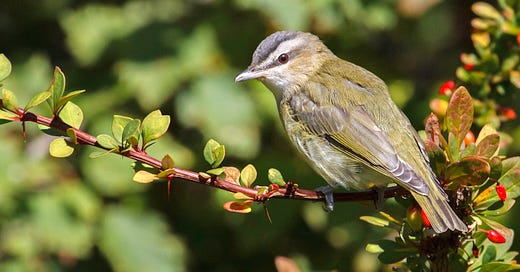As Israel and Iran went to war, the vireo sang his melody from a Silver Maple in my yard. He sang through news of a plane crashing in India. And he continued to sing the morning a deranged man shot to death public servants in the U.S. state of Minnesota.
But let’s be honest about the Red-eyed Vireo: As songbirds go, this isn’t exactly an icon of charisma or even respite in times of terror. Lots of birdwatchers regard the Red-eyed Vireo, cast in muted olive, as bland or pedestrian. Even the red eye — more the color of blood — isn’t so red.
Yet one thing is undeniable about the Red-eyed Vireo: persistence. He sings incessantly, even in the heat of midday, when most birds fall silent. The vireo sings through sunrises and thunderstorms; he sings regardless of joy or injustice anywhere in the world.
But I should first point out that my use of “melody” and “song” are almost misnomers. The Red-eyed Vireo, no nightingale, is more so a talker with a rich vocabulary. The male utters a series of short, sweet phrases throughout the day. (The females don’t sing.) If you were to put words in this vireo’s mouth, he might sound, at least in cadence, like this: here I am … look up … in the tree … see me? … near the top … way up!
Here’s an example:
Any one Red-eyed Vireo might express dozens of different phrases like these in varying patterns. Nevertheless, the vireo, by way of his voice, is eminently recognizable, one of the most widespread and unfailing songs in all of North America. Especially in the eastern U.S., the Red-eyed Vireo is a background sound of spring and early summer — like a chorus of crickets, a baseball game, or even the drone of the neighborhood lawnmowers.
And yet I refuse to allow this songbird to fade into background. When the vireo sings, he is among the few things in the world that seem right and normal this week. Even an unadorned and unwitting songbird helps me find my footing. Perhaps even more.
Transcendence, almost a cliche in nature writing, is often conveyed on a grand scale — something wild and greater than any one of us: mountains, sunsets, desert, a place or experience evoking awe or reverence. The word derives from (the Latin) trans, meaning “across” or “beyond,” and scandare, meaning “to climb.”
To be sure, nature is great for our ascending beyond the ordinary or mundane, beyond ourselves, toward some state of equanimity or spirituality. So it might seem that a plain, monotonous songbird wouldn’t cut it as a path toward transcendence. That would be incorrect.
Here’s the thing about the Red-eyed Vireo: it lives bigger than most of us. The vireo in my yard had flown north this spring thousands of miles from its wintering grounds in Ecuador, Colombia, Brazil, or somewhere else in South America. When he landed here, finding my neighborhood in Vermont suitable, the vireo began to sing (and sing … and sing) for a mate who had made a similar journey. Together they’re raising a family, although she does most of the work building the nest, incubating eggs, and feeding young. Through it all, the male keeps singing.
And then the vireos will leave. When crisp winds blow from the north this autumn, the two adults will launch after sunset some evening for their southbound migration. Not until days or weeks later will their offspring depart. With no parents to show them the route, the young vireos will fly by night on their own toward South America, guided by little more than stars, an internal compass, and the winds of fate. And if any of the family survives winter in the tropics, or the journey north, the vireos will be back to the U.S. or Canada next spring, perhaps even one or two of them returning to my yard.
Thousands upon thousands of miles. Perils everywhere. Death by anything from deforestation to storms to window strikes. Or a nest full of vireos. All that from a prosaic bird weighing no more than an ounce. And all of it expressed in a song persisting throughout the day. Never will I take that for granted.
Transcendence? Perhaps. Certainly awareness. For me, an unassuming vireo embodies a world in motion, a world in peril — their world, our world. Here in the relative comfort of the U.S., despite the acrimony and corruption of our national politics, no bombs fall on my community, no children starve. But when wars and injustice nevertheless weigh upon me, I can rest in comfort and safety — and find temporary refuge in a songbird.
Even as it carries on through the day, the vireo reminds me that nothing is guaranteed, except impermanence. The world we know could become better. Or it could be gone in an instant. I dare not let any note fade into background. And so I now hear other phrases in the voice of a Red-eyed Vireo. The song goes something like this: love yourself … love the world … make it better … do your best … then do more.
Related Essays
The Red-eyed Vireo song recording comes courtesy of Doug Hynes, Xeno-Canto and Creative Commons (CC BY-SA 4.0)








Oh, I read this and my eyes well up with tears. Yes. Each moment we have in nature helps us endure the stress of human horrors. Environmental degradation. Lack of empathy. Yet for the complex systems of those other lives that endure and their beauty, yes, they are our respite from the fray... we can be saved. Saved by that recognition of the vireo, or whatever catches your attention in nature. Thank you Bryan. You keep our community going.
Yeah verily, or vireoly, but, what's that you say? I can't hear you for the red-eyed vireo right now singing so nearby. Thanks Bryan, for yet again being Bryan.